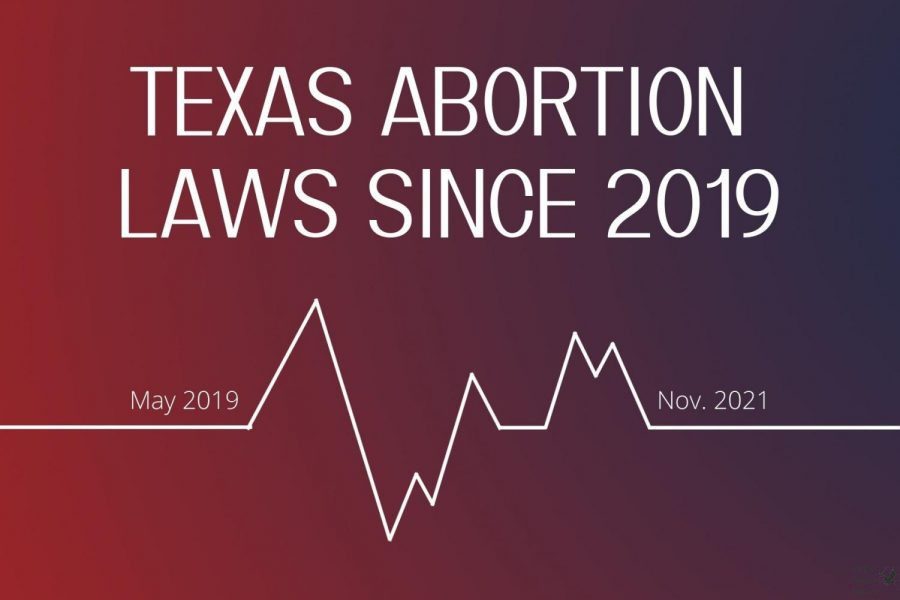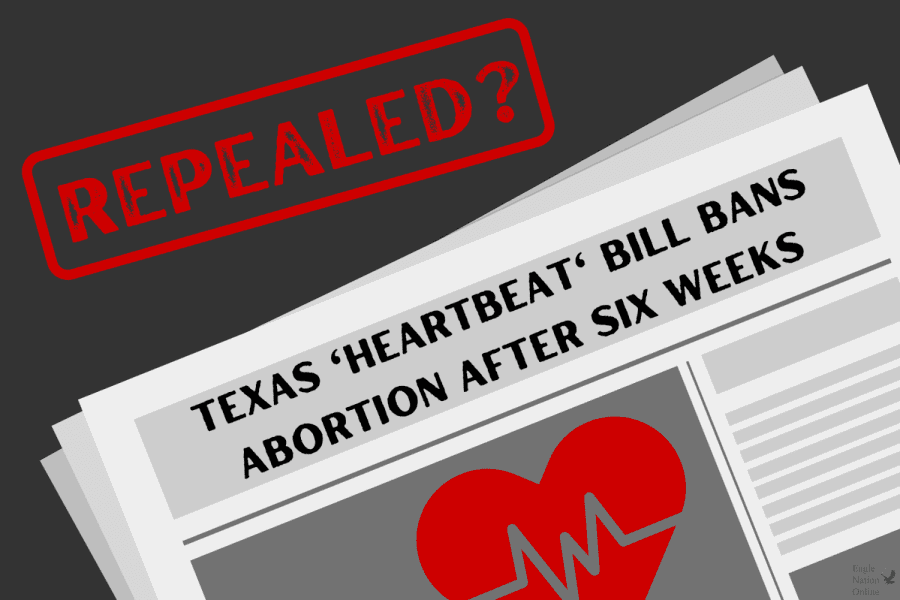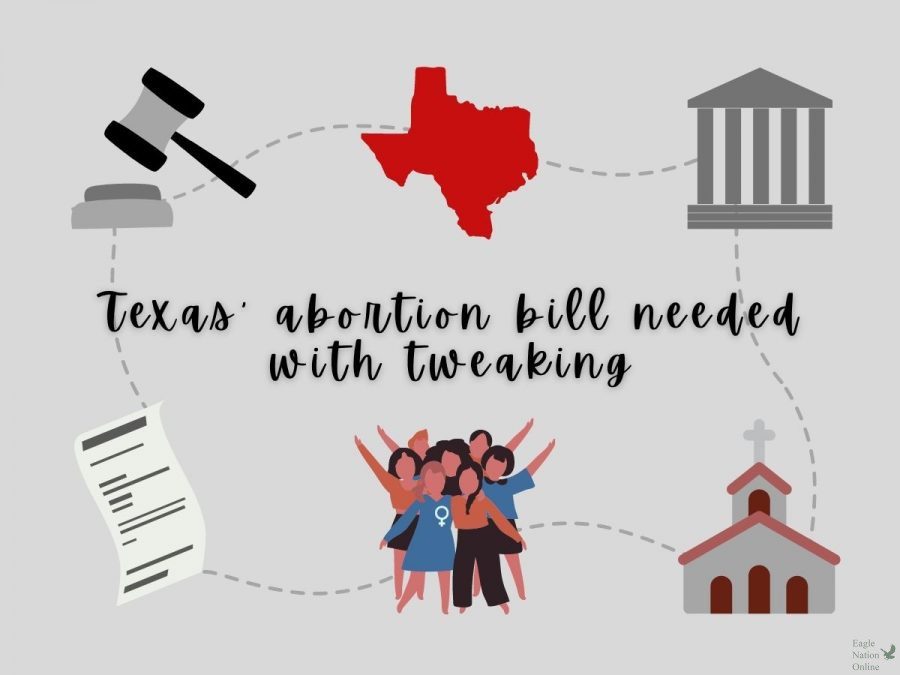A graphic shows a timeline and heartbeat reading for a graphic of abortion laws over time. The Texas Heartbeat Bill went into effect Sept. 1, banning abortions after a heartbeat can be detected. Since then, the law has been discussed in the Supreme Court.
Students cover ‘Texas Heartbeat Bill’ in multimedia presentations
Timeline shows abortion legislation in Texas since 2019
December 3, 2021
Click the arrows above to explore a timeline displaying abortion legislation changes in Texas. The Texas Heartbeat Bill went into effect Sept. 1. This law was followed with legal action against it as well as requests for a temporary restraining order. The bill was considered in the Supreme Court on Nov. 1, but no announcement was made from the oral hearing.
On Wednesday, Dec. 1, the Supreme Court began hearing oral arguments that challenge Mississippi’s ban on abortions after 15 weeks of pregnancy. The court is deciding on whether to overturn the 1973 court case Roe v. Wade, which established the right to abortion. Earlier this year, Gov. Greg Abbott signed a “trigger law” that would outlaw abortion if the Supreme Court overturns Roe v. Wade.
Watch the video below to view an Eagle Nation News broadcast package by junior Diane Shaw. Continue reading below to view two opinion pieces from seniors Morgan Reese and Caleb Audia from each side of the abortion controversy.
In a graphic by journalist Morgan Reese, a newspaper reads: “Texas ‘heartbeat’ bill bans abortion after six weeks.” On May 19, 2021, Texas Governor Greg Abbott signed Senate Bill 8, banning abortions after six weeks of gestation. “Abortion is healthcare,” Reese said. “All women should have access to safe abortions and control of their medical decisions and bodies, as decided in Roe v. Wade. Senate Bill 8 only increases the likelihood of unsafe abortions, maternal fatalities and an increasingly overwhelmed foster system.”
Opinion: Texas’ ‘heartbeat’ bill must be repealed, Roe v. Wade protected
Texas Governor Greg Abbott signed Senate Bill 8, the “Heartbeat Bill,” into law on May 19, prohibiting abortions at six weeks of gestation. This law is a direct violation of the Roe v. Wade Supreme Court case, which is typically used as a precedent for cases and laws regarding reproductive rights. Now, other states like Mississippi have passed laws banning abortion earlier than stated in Roe v. Wade. The Supreme Court of the United States examined Mississippi’s 15-week abortion ban Dec. 1, and their position thus far leans toward an overturn of Roe v. Wade.
Abortion is healthcare. All women should have access to safe abortions and control of their medical decisions and bodies, as decided in Roe v. Wade. Senate Bill 8 only increases the likelihood of unsafe abortions, maternal fatalities and an increasingly overwhelmed foster system.
Abortion laws are ineffective
One of the pivotal reasons women get abortions is because their pregnancy or life is in jeopardy, and many women will resort to an unsafe “under-the-table” abortion when access is restricted. In Margaret Wurth’s 2019 article from “The Progressive,” she states that the Center for Disease Control and Prevention released data revealing that hundreds of women die from preventable complications during pregnancy. Many abortions happen due to complications during pregnancy that may be fatal to the mother or the fetus, and banning abortions only increases the rate of these preventable deaths from pregnancy complications and unsafe abortions.
Bills restricting abortion have been proven ineffective, as they do not reduce the rate of abortion. According to the Guttmacher Institute, a reproductive rights research organization, annual fact report from 2020, the rates of abortion in countries where it is legal versus outlawed are very similar. Abortions will happen regardless of the law, as they are an integral part of women’s reproductive healthcare, and a ban only increases abortions happening unsafely. Currently, a woman can go out of state to receive an abortion, but it can be expensive and take more time than the woman has in the case of a fatal complication. While there are exemptions for women whose life is in danger, some situations can be time-sensitive, and going through the process of receiving an exemption may not be a time-safe option. Banning abortions is harmful to these women whose lives would be saved by an abortion.
Foster care is not a solution
The current foster care system in Texas is overwhelmed, with the number of children increasing tenfold from the number last year. Thousands of children have spent time at unlicensed placements due to the great number of foster children entering the system. In 2021, the number of children at unlicensed placements like churches, offices or hotels rose from 148 to 415 in six months, not counting the children who were placed in-between. An article from the Texas Tribune said that before 2021, these numbers stayed under 100. At these placements, children can experience sexual abuse, commit self-harming actions and receive improper medication dosages, according to the Texas Tribune, and most children spend an average of two weeks in these dangerous places.
The current foster care system is not in a stable place to be a primary solution for the mothers that cannot care for the children that they were forced to birth. If this ban is in the best interest of the women and children of the state and must be instituted, fixing the foster system by implementing more licensed facilities and staff must be done first for the safety and futures of all the children.
Religious versus scientific reasoning, the separation of church and state
The main advocates for abortion laws come from the country’s Christian majority, yet one of the founding proclamations of our country is to maintain separation of church and state. The establishment clause of the first amendment states that no laws can be made “which aid one religion, aid all religions, or prefer one religion over another.” Many supporters of the law’s reasoning are based on verses from the Bible, like Jeremiah 1:4-5. A law should not be made based on a religious belief to maintain separation from church and state, as stated in the Constitution.
The New International Version of the Bible’s Jeremiah 1:4-5 states, “Before I formed you in the womb I knew you, before you were born I set you apart; I appointed you as a prophet to the nations.” Believing this verse to be a solidification of life beginning at conception is a stretch, as this verse was directed at Jeremiah about his position as a prophet, not the general populous. The verse does not state that a fetus is alive once first placed in the womb, only that in the Christian belief a soul has a set purpose unknown to man before conception.
This idea of being alive is based on a spiritual belief, not the science of a fetus being a conscious human. An article from Scientific American says conscious, meaning one has an awareness of life, requires “a sophisticated network of highly interconnected components, nerve cells,” which do not form until 24 to 28 weeks. Two months later, “synchrony of the electroencephalographic (EEG) rhythm” connects the hemispheres of the brain and signals full consciousness. Senate Bill 8 prevents abortion from six weeks. This is before the fetus even has nerve cells to process surroundings and have a conscious awareness of life. If this law were to be in place, the restriction being put in place this early, before most women even know they are pregnant or have missed a menstrual period, is ridiculous, as the fetus is not yet aware.
The namesake of the “Heartbeat Bill” comes from the belief that the fetus is alive at around six weeks, as a heartbeat can be heard. Live Science says that this heartbeat is actually merely a flutter from the place where the heart will eventually develop throughout the first trimester, and can not be heard with a stethoscope, only advanced ultrasound technology. In addition, this flutter existing does not determine if the fetus will develop a viable heart.
Conclusion
If Senate Bill 8 is to stay or Roe v. Wade is repealed, a solution must be found for the foster care system overpopulation and easily accessible exceptions to situations like rape, incest and unviable pregnancies must be set.
Despite the law, abortion will always be a vital aspect of healthcare.
Shown in the graphic above by Multimedia Director Caleb Audia, details highlighting some of the points in the article are expressed. “The abortion bill is needed, but should be tweaked in order to pass Congress,” Audia wrote expressing his opinion on the topic. Texas Governor Greg Abbott enacted the Texas Senate Bill 8 on May 19.
Opinion: Texas’ abortion bill needed with tweaking
A hot-topic in the recent elections, abortion has made its fair share in political division. On May 19, Texas Governor Greg Abbott enacted the Texas Senate Bill 8 – also known as the Heartbeat Bill. This bill restricts access to abortions in the state of Texas if the fetus has a detectable heartbeat and/or is over six months in the gestation period.
The abortion bill is needed, but should be tweaked in order to pass Congress. The reasons why, however, are quite broad.
Religious impact, life begins at conception
It should be easily pointed out that the majority of Texan and American citizens identify their religion as Christian, and can be proven according to the Public Religion Research Institute, where “70% of Americans identified as Christian” in their polling. Looking into the Bible, which is the notable book on which Christianity is based on, the Bible states that life starts at conception, as is further explained below.
Focus On The Family, a Christian-based organization that further evaluates scriptures in the Bible, states that in Jeremiah 1:4-5 the stance on abortion is written as, “Now the word of the Lord came to me, saying, ‘Before I formed you in the womb, I knew you, and before you were born, I consecrated you; I appointed you a prophet to the nations.”
What this can be evaluated as, and is further evaluated on by Focus On The Family, is that the Lord gives plans and meaning of life to fetus’ before they are in the womb – or as Focus On The Family describes as: conception. Conception can be scientifically described as the fertilization of the egg by sperm, and, typically, the conception period varies within a couple of hours to two weeks.
Essentially, while church and state are expected to, and should be, seperated in the United States’s government, the fact that the majority of Americans can be expected to lean a specific way as a result of their religious belief should be noticed in determining the handling of the topic.
Not only religiously, however, should the topic be considered, but scientifically fetus’ receive their own unique DNA coding in conception, to which many can describe as the first hint of life.
While the Heartbeat Bill restricts abortion to six-weeks in the gestation period, and the majority of Christians believe abortion should be abolished entirely, it’s still an honorable improvement when compared to the previous laws, bills and acts surrounding the issue. Also surrounding the Heartbeat Bill – continued abortion access in specific cases.
New-born health
While the act makes it a crime for a physician to perform an abortion with a detectable heartbeat, a specific exception that’s outlined in the act is if the mother’s life is physically endangered. The act also states that the exception does not apply to physiological or emotional disorders, illnesses or conditions.
This is an important exception to the bill, and according to the National Center for Biotechnology Information – a government organization that specializes in health by providing access to biomedical and genomic information – postnatal care of both the mother and the newborn is an important part in maintaining the newborn’s health. If the mother’s life was at risk by the birth of the newborn, and her state was unhealthy after the birth, the newborn would not receive the care that is typically needed, and could be detrimental to the baby’s physical or emotional health.
The bill needs tweaking
While there are, arguably, many issues with the Foster Care system – to which I agree – the solution cannot be to end life. Instead, inside of the bill, there should be allocated funds for Foster Care systems that can increase the functionality of the program, and allocated resources for individuals facing abuse.
Another issue that frequently comes up in the support of the act in courts and public support is the blocking of abortions for fetus’ conceived in cases of incest or rape.
While the majority of Americans are Christian, and according to the Bible, can be expected to support the act, cases like rape and incest are commonly a “soft-spot” in this topic. In order to gain more support for the act, as well as gain the trust of the majority of the public, the act should be tweaked to allow specific exceptions in cases like rape and incest.
Impact of the bill
Not only would the act signify the United State’s viewpoint and opinion on abortion, but will also set a precedent for how the country deals with the rights of unborn children in the future. Looking in the effect that Texas’s Senate Bill 8, also commonly known as the “Heartbeat Bill,” according to the Center of Disease Control and Prevention’s statistics, an abortion ban at six-weeks could prohibit the abortions of 33,000 fetus’ per year in Texas alone.



